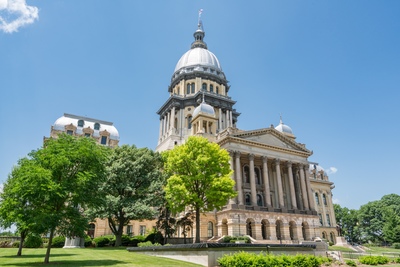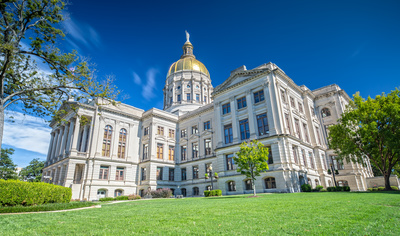
Energy & Environment
How Small Modular Reactor Laws Are Reshaping State Nuclear Energy Policy
January 23, 2026 | David Shonerd
February 20, 2024 | Matt Crawley

Key Takeaways:
After fielding dozens of advanced recycling bills in 2023, and with half of state legislatures carrying over bills from the previous session, we expected momentum to continue in 2024. Thus far this year, state legislatures have considered 30 bills related to advanced recycling. About half of the bills were carried over from 2023, and others were newly introduced bills in Vermont, Rhode Island, West Virginia, New Jersey, Massachusetts, Washington, Colorado, Illinois, Hawaii, Virginia, and Wyoming. Most of the new bills focused on defining advanced recycling and related practices in relation to solid waste, but a few sought to ban advanced recycling practices altogether, and others considered advanced recycling where it intersects with packaging EPR (extended producer responsibility) and environmental justice issues.
“Advanced Recycling” is a loose umbrella term used to describe a number of non-mechanical methods for recycling plastics, including chemical recycling methods. Proponents in the chemical industry tout it as an effective and sustainable solution, while environmental groups question its impact and claims of sustainability, and some recycling industry groups dispute the scope of its definition.
Of the bills carried over from 2023, there are two bills in Alaska (AK HB 143) and Nebraska (NE LB 599) that we’re watching closely. Both would create legislative frameworks for advanced recycling in their respective states, and make them the 25th and 26th states to regulate advanced recycling. The bills follow the industry playbook of decoupling advanced recycling from solid waste regulation and instead define it as a manufacturing process. Solid waste regulations are generally more onerous than those governing traditional plastics recycling, and exclusion from their authority can also allow facilities to receive certain state financial incentives.

Both bills also declined to include waste-to-energy processes from their definitions of advanced recycling. Waste-to-energy facilities have been one of the major flashpoints within the greater debate surrounding advanced recycling. The process has been touted by supporters as a practical alternative to landfilling plastics, much to the dismay of environmental groups and even some recycling industry groups whose definitions of recycling do not include the practice.
Some states continue to include waste-to-energy processes under their definition, while others have opted to update their regulations in favor of a focus on plastic-to-plastic recycling goals. Louisiana and Texas were two such states that amended their definitions in 2023.
We are also watching a bill in Maine (ME LD 1660), which, last Thursday, became the first advanced recycling-related bill to pass both chambers in 2024. Until recently, the bill would have defined "advanced recycling” as a solid waste practice. As amended, the bill lost all mention of “advanced recycling” as a term, and instead trained its focus on “chemical plastic processing.” This was defined as “the processing of plastic waste using chemical or molecular methods into basic raw materials, feedstock chemicals, fuel for combustion, waxes or lubricants” and labeled facilities that use this practice as solid waste facilities.
The bill also makes a distinction between "chemical plastic processing" and “plastic-to-plastic recycling,” with the latter’s definition retaining the molecular structure of the plastic while reconstituting the molecular precursors or intermediates into plastic polymers using methods that result exclusively in the production of new plastic material. This definition seems to mirror that of mechanical plastics recycling and is considered to be recycling under the bill. The change in direction could be an attempt to further clarify which practices the state wishes to define as solid waste.
Two key bills in California (CA AB 1705) and New Hampshire (NH SB 267) died in January after the former failed to pass out of its house of origin before the end-of-the-month deadline, and the latter was voted “inexpedient to legislature.”
Among the newly introduced bills were efforts to allow for the use of advanced recycling practices. Like most bills with this aim, bills in New Jersey and Wyoming seek to prevent advanced recycling practices from being regulated as solid waste management. Specifically, the New Jersey legislation (NJ AB 2776) would “exempt plastic material transported and delivered to, and processed at, an advanced plastic processing facility from state laws regulating the disposal or recycling of solid waste,” while still applying state environmental laws to such practices. The Wyoming legislation (WY SF 80) would also remove the solid waste classification and instead define advanced recycling as a manufacturing process — another key step in the process towards favorably regulating advanced recycling.
Some of the newly introduced bills seek to ban advanced recycling practices altogether. In Vermont, legislation (VT HB 602) would prohibit the construction or operation of any new facility that uses a “regulated technology” to transform plastic or plastic-derived materials into, among others, plastic monomers, chemicals, and chemical feedstocks. Those regulated technologies include practices like gasification, pyrolysis, and solvolysis — all processes that fall under the advanced recycling umbrella. The bill’s language closely resembles that of the model bill language included in the October report critical of advanced recycling practices published by Beyond Plastics, a project aimed at ending plastic pollution based at Bennington College in Vermont. We will be watching to see if any other states pick up this language as the session continues.
Other new bills discuss advanced recycling from different perspectives. Washington lawmakers introduced legislation (WA HB 2049 & WA SB 6005) that would tackle advanced recycling via new packaging EPR legislation. Packaging Extended Producer Responsibility (EPR) legislation has quickly become a hot issue for legislators in recent years — in 2023 there were over 40 packaging EPR bills introduced across 14 states. This iteration would focus primarily on paper products while creating new minimum post-consumer recycled content (PCRC) requirements for plastic products. The bill would also allow producer responsibility organizations (PROs) to utilize facilities that employ "alternative recycling processes” — recycling processes that occur other than through purely mechanical means — so long as they don’t include combustion, fuel production, or other forms of energy recovery from plastic covered products. This line is in step with a number of previous bills that use similar criteria to differentiate acceptable forms of recycling under EPR standards — most refuse to recognize waste-to-energy or other chemical processes as recycling.
Additionally, under the proposed bill in Washington, PROs must also ensure that alternative recycling process facilities do not cause environmental impacts on overburdened communities and vulnerable populations. Environmental justice issues have become inherent to legislative conversations about advanced recycling in recent years, especially since the majority of advanced recycling facilities are located in historically marginalized communities.
We expect bill activity to increase as the year progresses. MultiState’s team is actively identifying and tracking legislation related to recycling so that businesses and organizations have the information they need to navigate and effectively engage. If your organization would like to further track recycling or other related environmental issues, please contact us.

January 23, 2026 | David Shonerd

January 22, 2026 | Daniel Kampf

October 27, 2025 | Billy Culleton